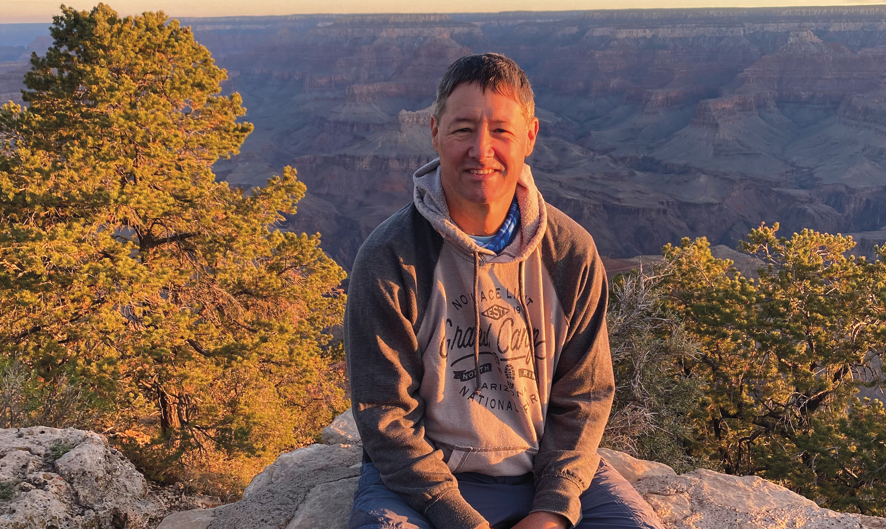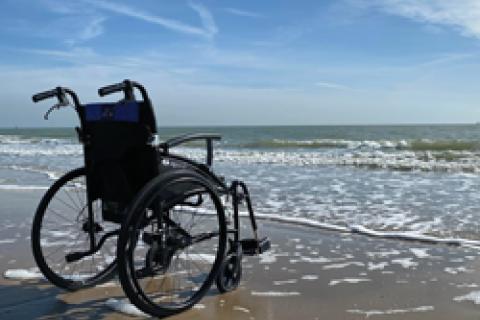
Fr. Clint Ressler, Catholic pastor in Texas City, Texas
Fr. Clint, what was your path to the priesthood?
I was born and raised outside a small town east of Houston. My parents live on a small piece of farmland on the same road my dad was born and raised on. My brother and sister live on that same country road.
We all grew up playing sports. Though I played baseball from the time I was 6, it was football that I fell in love with. I wanted to be a wide receiver in the NFL. Sadly, my career was cut short by a tragic lack of talent!
In early 1985, I was in college studying for a career in sports medicine when I felt a call to make God the center of my life. I spontaneously wanted to discover his will for my life. Within a few months, I began to sense a possible vocation to the priesthood, which led me to seminary in Houston in the autumn of that year.
In 1988, I came to know the spirituality of unity of the Focolare, and that made a big impact in my life.
I was ordained in 1993 and served in a parish for some years, after which I went back to studying and completed a degree in spiritual theology. I was then assigned to another parish and served as diocesan vocation director for 7 years. Following that assignment, I have served as pastor at 2 parishes for a total of 15 years.
How has your understanding of and living out that role as pastor evolved over the years?
I had a good start. My seminary formation stressed the point of priesthood as service. My formation in the spirituality of the Focolare reinforced this by emphasizing concrete acts of love towards each neighbor, loving Jesus in and through my neighbor.
However, becoming a pastor brought new challenges. I felt responsible more than ever for leading, and that meant concretely making decisions. It meant being in a position of power in the structures of the parish. The dynamics changed, and I wasn’t totally conscious of that.
I can now see that early on I was fulfilling role expectations. I tried to be what people (the bishop, other priests, parishioners) wanted me to be and do. My goals and activities were shaped by them. However, they were also shaped by my own “spiritual DNA.”
I used to think leadership was about vision and goals, problem solving and how many of my ideas I could bring to reality through using others to get things done.
Eventually it dawned on me that there’s a difference between positional leadership and character leadership. The example of deacons and other lay leaders has been a true gift and model in this. As a consequence, co-responsibility and shared discernment have become much more important.
How would you describe your leadership style in the parish? How do you try to be a servant-leader in the parish today?
“Servant” describes the approach to pastoral ministry, such as attending to the sick, to the hurting, to funerals, to wedding prep... but it also should describe how a pastor administers and manages the parish.
Today, I’m more aware that as a leader I need to be the “Listener in Chief.” Not only do I try to listen, listen and listen—I need to create the conditions whereby people feel free to speak, free to say uncomfortable things or present challenging perspectives.
I have not always succeeded, of course. For example, if I feel surprised or confronted, I tend to freeze up or react poorly. Sometimes I’ve been too caught up in busyness to enter deeply into the other’s concerns. I am working on improving in this area.
This aligns well with Pope Francis’ stress on creating a synodal Church, a church that walks together and that listens to the Holy Spirit in the voices of everyone inside or outside.
It takes vulnerability, trust, authenticity and not avoiding healthy conflict. I’m learning that humility is much better than pretending to have everything together. Creating a mistake-friendly environment is freeing to staff and volunteers.
I am learning to apologize. I’m consciously trying to apologize regularly. I try to give credit to others and accept blame, rather than take credit and assign blame. It entails living intentionally the value of people over projects and even over progress.
As a servant-leader, I aim to raise up other leaders by helping them discover their God-given gifts. The power pyramid is turned upside down. The question I ask myself as a leader is, “Who do I support?” rather than “Who reports to me?”
How do you set goals for your parish?
Values, vision, goals: where do these come from? A servant-leader is in service to values and to a vision that comes from God. Certainly, those things are found in the Bible. And sometimes there are pastoral plans discerned and created by church leaders like the pope or the bishop.
In the parish, however, we still have to pray. We have to ask the Holy Spirit continually to show us how. How do these values become concretized? How does the “Word become flesh” in this concrete situation?
So, I think it’s important to realize and always be reminded that a servant-leader is in service to God and God’s plan.
You served as the team chaplain for the NFL’s Houston Texans. How did you land that job?
Back in the Spring of 2002, when the new Texans franchise was starting, they were looking for a Catholic priest to serve as one of two team chaplains, one Catholic, one Protestant.
The Texans contacted the archdiocese with their request. At the time, I was the vocations director for the archdiocese. From the perspective of the archdiocese, my not having a weekend parish commitment made me an obvious choice. It made it easy to schedule myself around the home games. What’s more, it would be a great benefit to my ministry of promoting vocations.
Once I got the job, I would walk into various gatherings of young people and tell them that I was in the NFL!
How did you exercise leadership in your role as the team’s chaplain?
Each team determines the scope of the ministry of their chaplains. Often it includes church services (Mass for Catholics, generally the night before the game) but can also include direct spiritual or pastoral support to the players, coaches and other staff. I officiated at weddings, funerals, baptisms and such over the 19 years I served the Texans.
It may sound a bit odd but, looking back, my role with the Texans was to be like St. Mary. To be an NFL chaplain is to be a priest on such a public stage, visible on the sidelines and having access to very public people. Yet, I was just a presence, like Mary who followed Jesus in his public ministry, often on the edge of the action.
My role, exercised in many different ways, was to invite, draw and influence players, coaches and other staff towards the truly important and lasting values of the Gospel.
In a heady world like the NFL, one can easily and quickly get lost or be led astray. Power, money, survival and success create a dangerous atmosphere.
My role was to remind them about love, service, compassion, forgiveness and faith in God’s strength rather than their own.











